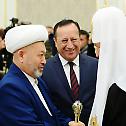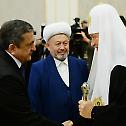Patriarch Kirill meets with Grand Mufti of Uzbekistan and chairman of the Committee on Religious Affairs of the Cabinet of Ministers of the Republic of Uzbekistan
On 29 September 2017, in Tashkent, His Holiness Patriarch Kirill of Moscow and All Russia met with the chairman of the Spiritual Administration of Muslims of Uzbekistan, Grand Mufti Usmankhan Alimov, and with Mr. Ortiqbek Yusupov, chairman of the Committee on Religious Affairs of the Republic of Uzbekistan.
Taking part in the meeting were Mr. Sh. Minovarov, director of the Centre of Islamic Culture of the Cabinet of Ministers of the Republic of Uzbekistan; Mr. M. Shakirov, head of the International Department of the Spiritual Administration of Muslims of Uzbekistan; Mr. B. Kadyrov, advisor of the Committee on Religious Affairs of the Cabinet of Ministers of the Republic of Uzbekistan; Mr. Sh. Khadamov, press secretary of the Committee on Religious Affairs of the Cabinet of Ministers of the Republic of Uzbekistan. The Russian Orthodox Church and the Embassy of the Russian Federation were represented by Metropolitan Vikenty of Tashkent and Uzbekistan, head of the Central Asia metropolitan area; Metropolitan Hilarion of Volokolamsk, chairman of the Moscow Patriarchate’s Department for External Church Relations; Archbishop Sergy of Solnechnogorsk, head of the Moscow Patriarchate’s Administrative Secretariat; Mr. Vladimir Tyurdenev, Ambassador Extraordinary and Plenipotentiary of the Russian Federation to the Republic of Uzbekistan; Mr. Vladimir Legoyda, chairman of the Synodal Department for Church-Society and Media Relations; and Rev. Dimitry Safonov, DECR secretary for interreligious relations.
Having greeted the Primate of the Russian Orthodox Church, Mr. Ortiqbek Yusupov, chairman of the Committee on Religious Affairs, told him about the cooperation between the governing bodies of the Republic of Uzbekistan and the Tashkent diocese, as well as about the current state of interfaith relations in the country.
“The government welcomes the fact that through the efforts of Metropolitan Vikenty there has been planned to construct a centre of Orthodox education and culture at the diocesan administration, as well as a museum of Christianity of Central Asia,” Mr. Yusupov said, in particular. In his address he also spoke of the measures that the government takes to combat religious extremism and terrorism.
Mufti Usmankhan Alimov emphasized that “these days require cooperation of all religious communities and all peoples in combating extremism and international terrorism.”
His Holiness Patriarch Kirill addressed all those present, saying in particular:
“I visited your country many times, for the first time when it was a part of the Soviet Union. It was back then that the remarkable traditions of our interaction and cooperation were established. Every time I came to Uzbekistan and met with your predecessors, I felt at home. We were of the same mind, and that like-mindedness was grounded in our common experience. We withstood hard years of state atheism and it was not often that we felt the authorities’ positive attitude towards us. Yet, in Uzbekistan religious communities were treated in a milder manner than in Russia…
“When the Soviet Union republics became sovereign states, we at some point felt that the ties between us weakened. However, we always heard, from the Muslims of Uzbekistan for instance, ‘We need to be together again; we live in different countries, but we face common challenges.’ It was in line with the traditions of good cooperation that the first Patriarchal visit to independent Uzbekistan took place – in 1996 my predecessor, His Holiness Patriarch Alexy II of blessed memory, arrived in the country, and I accompanied him. We had very good contacts with our Muslim brothers, with leaders of the Islamic community. I recall my meeting with Mufti Mukhtar-haji Abdulayev, a good friend of our Church. We had a lengthy conversation, as the result of which the idea of holding a summit of religious leaders in Moscow was agreed upon. In 2006 Mufti Abdurashid Bakhromov took part in that summit as the head of a large delegation from Uzbekistan.
“We engage in dialogue with various religions and Christian confessions, however, for us, Orthodox Christians living in Russia not just as neighbours, but side by side with a large Islamic community, the dialogue with Islam is of particular importance. Twenty years ago we began theological dialogue between the Russian Orthodox Church and Iranian theologians. When we realized that we had similar views on many issues, we decided to establish a permanent Commission of the Russian Orthodox Church and Iran… We have close relations with the Muslims of Turkey, Syria, Iraq, Egypt, Azerbaijan and other countries.
“In Russia we attach great importance to holding on regular basis consultations between the traditional religions – for us these are Orthodoxy, Islam, Judaism and Buddhism. Representatives of these four traditional religions constitute the Interreligious Council of Russia, where we discuss numerous issues.
“I know that the Spiritual Administration of Muslims of Uzbekistan devotes particular attention to combating pseudo-religious extremism and terrorism. I know that Uzbekistan’s government in the person of the President and departments also expresses its serious concern.”
The Primate of the Russian Church thanked the participants in the meeting for “rendering assistance to the programmes organized by Vladyka Vikenty and his clergy.” “In 2003, with the support from the President and with your participation, the religious and administrative centre of the Tashkent diocese was built. The authorities of Uzbekistan took the most favourable attitude, and we appreciate it and are grateful to you,” His Holiness added.
Source: mospat.ru










